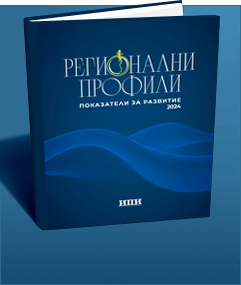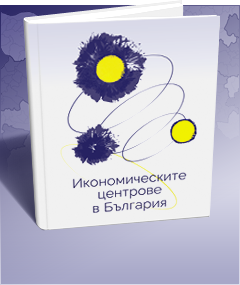The average result of National External Evaluation in mathematics after the seventh grade is Weak (2) in 181 municipalities
On the eve of the new academic year, it is time to look back at the results from the previous one. In this article, we focus on the grades from the National External Evaluation, which is mandatory for all seventh graders and includes exams in Bulgarian Language and Literature as well as Mathematics.
The data for the results of the external evaluation are available on the Open Data Portal, where the average grade for Bulgarian language and literature, as well as mathematics, is published for each school in the country, along with the number of students who took each of the two exams. The average grade for the two mandatory subjects is calculated as the average of the schools in it, weighted by the number of participating students. In this way, for example, the average grade of a school with 50 seventh graders would have 10 times the weight in the overall average for the municipality under consideration compared to a school with five students.
In 2022, a total of 58,567 students took the National External Evaluation for Bulgarian Language and Literature, with an average score of 53.63 out of 100. For mathematics, slightly fewer students took the exam - 58,349 - although both exams are mandatory. The average grade here, as usual, is significantly lower at 35.32 points. It is important to note that these results also include students from abroad, 21 in total.
The municipalities with the highest scores in Bulgarian language and literature are Borino (70.5 points), Varna (67.88 points), Nedelino (66.47 points), Zlatograd (66.17 points), and the capital city municipality (65.31 points). Large regional centers rank relatively high, where the higher competition among schools and the availability of more resources contribute to higher quality education. Very small municipalities perform the best, partly because each student has a significant weight in the final average grade. However, there are also significant differences in achievements between individual years in these municipalities, precisely because of the significant influence of individual students. Thus, a few excellent performances could send a municipality to the top of the ranking, while a few very weak performances could place it at the bottom. The municipalities with the lowest scores in Bulgarian language and literature are Novo Selo (9.19), Makresh (10), Chuprene and Madzharovo (12.80), and Nevestino (16.23), which are among the municipalities with the fewest participating students.
The results in mathematics resemble those in the Bulgarian Language and Literature, with very small municipalities at the top and bottom of the ranking, while large regional centers perform relatively well. Once again, the municipality of Borino takes the first position with 64.03 points, followed by Banite (61.23), Zlatograd (54.24), Varna (50.08), and Tsenovo (49.21). The capital municipality ranks seventh with 47.33 points. At the bottom of the mathematics ranking are Georgi Damyanovo (9 points), Borovo (9.02), Yakimovo (9.96), Kovachevtsi (10), and Tran (10.97), with none of these municipalities having more than 30 students participating. Regarding clusters with relatively high mathematics scores, they can be observed in the municipalities of the Smolyan region, which is characterized by a well-developed educational system, as well as in the Srednogorie region.
In 2022, the trend persists in almost all municipalities in the country that the grades for Bulgarian language and literature are significantly higher than those for mathematics, with only 10 municipalities showing the opposite result, compared to 15 municipalities in the previous external evaluation. However, the average difference slightly widens, with a 15.7-point advantage for the Bulgarian language compared to a 14.1-point advantage the previous year. This mainly reflects the increase in the number of municipalities with extreme differences between the results of the two subjects - there are already 87 municipalities with a difference of over 20 points, compared to 58 municipalities in 2021. This dynamic is partly dictated by the differences in the content of the exams between individual years, which do not guarantee comparability and fully equivalent levels of difficulty.
The dynamics of the results compared to the previous year are diverse. Improvement in mathematics grades is observed in 116 municipalities, while in Bulgarian language and literature, improvement is seen in 81 municipalities. All municipalities with extreme differences - both positive and negative - are very small municipalities where the influence of individual students is significant. The results are relatively stable in the largest municipalities - there is no change in the average number of points for Bulgarian language and literature in the capital city, while there is a decrease of 3 points in mathematics. At the same time, Plovdiv registers a slight increase in Bulgarian Language and Literature results and a decrease in mathematics, while Varna experiences a decrease by one point on both exams.
Unlike previous years, in the 2021/22 academic year, there is no officially published scale for equating the scores of external assessments to the standard six-point grading system. However, if we use the newly introduced standard for assessing maturity exams after the 12th grade and external assessment after the fourth grade, students would need 30 points to achieve a grade of Average (3) and pass the external assessment successfully. The average score for the Bulgarian language and literature exam in 52 municipalities falls below this threshold, while in mathematics, the results in a total of 181 municipalities would not reach the passing grade. Such equating highlights the problem that in over two-thirds of the municipalities in the country, the preparation in mathematics is insufficient, and the average result of the participating students is not enough to achieve a grade higher than Weak (2). On the other hand, if we apply the scale from the previous external assessment, which sets a significantly lower criterion, only 4 municipalities would fall below the passing grade for the Bulgarian language and literature exam, but for mathematics, as many as 29 municipalities would fall below the passing grade.
The significant differences between individual schools are also striking. 32 schools achieved an average score of over 80 points in the Bulgarian language and literature exam, while 489 out of a total of 1736 schools participating in the external assessment scored below 30 points. It is noteworthy that among the top 10 schools ranked by performance in the Bulgarian language and literature exam, six have a mathematical or science-mathematical profile, confirming the conclusion about the overall higher quality of education in these types of schools. The inequality is even greater in mathematics, with only 16 schools achieving an average score above 80 points, while more than half of them, a total of 1035 schools, scored below 30 points.
These results are a cause for serious concern. They indicate a significant concentration of quality mathematics education (and exact sciences in general) in a very small number of elite schools that achieve very high results, not only on national exams but also in international Olympiads. However, outside of these schools, the quality drops sharply, leading to a decrease in the number of students who are subsequently able to pursue education in fields that require more serious preparation in mathematics. From an economic development perspective, this circumstance hinders the potential for the development of several industries, especially in the ICT sector and the higher segment of industrial production, which have been among the main drivers of growth in the country in the last decade. Overcoming these inequalities and improving the overall quality of mathematical education on a mass scale will be among the most important challenges for future governance.

